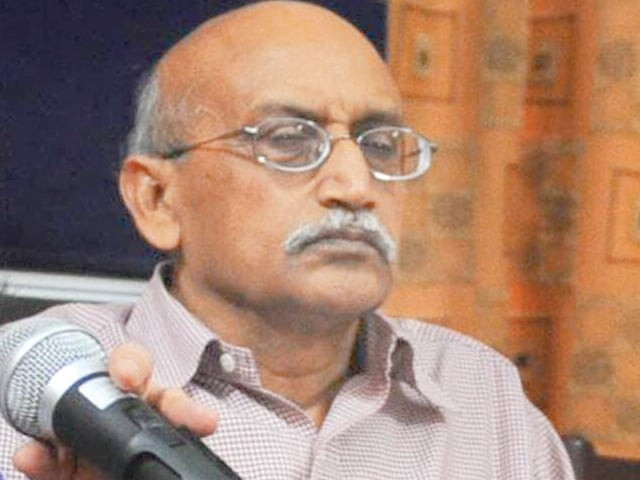‘Isn’t it shameful that in a country with the atomic bomb, women are dying like flies?’
Well-trained midwives leave the country while those who remain are often poorly trained.

Obstetrician-gynaecologist Dr Shershah Syed Syed recalls how he had never seen a maternal death or a chronic fistula until he returned to Pakistan after overseas postgraduate training. Witnessing the complications of childbirth had a profound effect on him: he abandoned his plans to establish a private infertility clinic and, in 1994, headed to Ethiopia to train in vesico-vaginal and recto-vaginal surgery. Since then, he has remained in Pakistan providing obstetric care to impoverished women.
“Safe motherhood includes providing emergency obstetric care and working to prevent maternal deaths, stillbirths and fistulae,” he tells The Lancet, a prestigious international medical journal.
In a report published in its April 16-April 22 issue, Dr Shershah says that his priority is “to train more community midwives, nurses, and doctors to help improve maternal care”. Safe motherhood cannot be improved without an army of trained midwives, he explains. “We need at least 150,000 skilled midwives who should work in villages,” he urges.
But 90 per cent of the country’s midwifery schools have no trained faculty. The problem is compounded by the way many well-trained, competent midwives leave the country quickly - often actively recruited by richer countries - while those who remain are often poorly trained.
Koohi Goth Women’s Hospital
At Karachi’s Koohi Goth Women’s Hospital, Dr Shershah and his team, in their spare time, treat more than 1,000 patients with vaginal fistulae - a highly debilitating, distressing and hidden result of complicated labour and stillbirth.
Established almost four years ago, with help from the United Nations Population Fund, the hospital now has a maternity unit and schools for training midwives and nurses. Dr Shershah and his colleagues have also translated and produced books on midwifery in Urdu and Sindhi. A training unit for nurse midwifery tutors has also been established — a first in the country. In addition to Koohi Goth Women’s Hospital, he also works at Qatar Hospital.
A humble Dr Syed
The Lancet describes him to be humble about his many contributions in clinical practice, training, education and for stressing the need for emergency obstetric care. “Shershah has always been a great advocate for women’s causes. His unbelievable stamina and ability to speak his mind against all odds are admirable,” says Dr Shereen Bhutta, a professor and head of the department of obstetrics and gynaecology at Jinnah Postgraduate Medical Centre.
For Dr Shershah, education and women’s rights are at the core of his values. Born into a Karachi slum, he was strongly influenced by his schoolteacher father, a Gandhian follower.
As a young man Dr Shershah wanted to be a journalist, but his father insisted that the primary qualification in the family was an MBBS. On his third attempt, Dr Shershah passed the exam for medical school, intending to do a master’s degree in journalism afterwards. But he became interested in medicine, and after he left Pakistan to avoid military service, he developed a career in obstetrics and gynaecology in Kenya, Ireland, and the UK. Yet his interest in journalism remains and alongside his medical career, Dr Shershah writes Urdu short stories that reflect life in poor communities and contributes regularly to newspapers. He writes about safe motherhood, women’s rights, and even nuclear proliferation.
An outspoken doctor
Dr Shershah is outspoken about problems with postgraduate medical training in the country, writes The Lancet. He speaks of the role of the medical elite who promote sophisticated and expensive medical technologies and treatments. These priorities are wrong, he tells the journal. “Isn’t it crazy? Isn’t it shameful that a country with the atomic bomb, F16s and a large army, is not able to control polio and its women are dying like flies. Its children work on roads rather than going to school? If the basic investment is wrong, how will things ever improve?” The tragedy is that the government understands the situation but has no will to act, he rightly points out.
Yet he finds hope in his efforts: “If I train one midwife from a poor community, she may save one woman’s life and her income will also improve her situation and the situation for her family.”
Published in The Express Tribune, April 26th, 2011.



















COMMENTS
Comments are moderated and generally will be posted if they are on-topic and not abusive.
For more information, please see our Comments FAQ